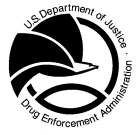 |
The DEA enforces federal laws and regulations related to the growth, production, or distribution of controlled substances. In addition, the DEA seeks to reduce the supply of and demand for illicit drugs, both domestically and internationally. The DEA has approximately 10,900 employees staffing its 23 division offices in the United States and the Caribbean and 86 offices in 62 other countries. |
Reports Issued
Follow-Up Review of the DEA’s Efforts to Reduce the Diversion of Controlled Pharmaceuticals
The OIG’s Evaluation and Inspections Division conducted a follow-up review to assess the DEA’s actions to control pharmaceutical diversion. Controlled pharmaceuticals such as narcotics, stimulants, and depressants can be diverted from legitimate channels through theft or fraud during the manufacturing and distribution process. In recent years, the Internet also has emerged as a significant source for diverted pharmaceuticals, with hundreds of Internet pharmacies providing large amounts of pharmaceuticals to customers without a prescription.
Our follow-up review found that the DEA has taken important steps to improve its ability to control the diversion of pharmaceuticals, especially over the Internet. Those steps include making diversion control a strategic goal, establishing performance measures for diversion control, centralizing its diversion criminal investigations with other criminal investigations, and providing additional intelligence resources to diversion investigators. The DEA also has increased the number of authorized domestic diversion investigator positions from 512 in FY 2004 to 587 in FY 2005. In an effort to control the increasing use of the Internet to divert pharmaceuticals, the DEA has increased the time (from 3 to 11 percent) diversion investigators spend investigating Internet diversion cases and developed an operational strategy for Internet investigations that has been used successfully in several large pharmaceutical diversion operations.
Despite these positive actions, we found that several shortcomings persist that were first reported in our 2002 review. While criminal diversion investigations increased 23 percent from FYs 2002 to 2005, the time spent by special agents assisting diversion investigations still constitutes a small share of their total investigative effort. Special agent assistance is critical because diversion investigators lack law enforcement authority and must depend on DEA special agents or other law enforcement officers to perform tasks such as making arrests and serving search warrants. Further, the diversion groups in the field still receive only limited support from intelligence analysts, and intelligence analysts and special agents are offered minimal diversion control training.
With respect to the DEA’s Internet efforts, we found that: 1) the Online Investigations Project, under development since 2001, has become a valuable investigative tool even though it cannot automatically identify websites with the highest volume of suspect pharmaceutical sales as the project was originally intended; 2) telephone and online hotlines for reporting suspicious Internet pharmacies have yielded few leads that resulted in diversion investigations; 3) the distribution of undercover credit cards to diversion groups has been slow; and 4) more than half the diversion investigators who received training for Internet investigations said the training was inadequate.
We made six recommendations concerning special agent support for diversion investigations, diversion training for special agents and intelligence analysts, and implementation of the undercover credit card program. The DEA concurred with five of the six recommendations and has presented an action plan for addressing all the recommendations.
Investigations
During this reporting period, the OIG received 258 complaints involving the DEA. The most common allegations made against DEA employees included job performance failure, false statements, release of information, and misuse of a credit card. The OIG opened 4 investigations and referred 249 allegations to the DEA’s Office of Professional Responsibility.
At the close of the reporting period, the OIG had 15 open cases of alleged misconduct against DEA employees. The most common allegations were fraud and theft. The following are examples of cases involving the DEA that the OIG’s Investigations Division investigated during this reporting period:
In our March 2006 Semiannual Report to Congress, we reported on a case in which an investigation by the OIG’s Miami Field Office led to the arrest of a former DEA special agent on charges that he submitted false expense vouchers for career fair expenses and received $13,405 that he was not entitled to. During this reporting period, the agent was sentenced to 3 years’ probation and ordered to pay $13,405 in restitution and perform 250 hours of community service.
A joint investigation by the OIG’s Washington Field Office and the DEA’s Office of Professional Responsibility led to the arrest and guilty plea of a DEA special agent assigned to the Richmond District Office on a charge of making false statements. The investigation disclosed that the special agent falsely denied having sexual relations with a female informant. He resigned as a result of the investigation. Sentencing is pending.
Ongoing Work
The DEA’s International Operations
To support international investigations, the DEA operates 86 offices in 62 foreign countries and assists its foreign counterparts through such activities as bilateral investigations, international forums, and foreign law enforcement training at its facilities in Quantico, Virginia, as well as in the host countries. The OIG is reviewing the DEA’s foreign operations and activities, assessing management controls over DEA international enforcement activities and offices, evaluating the exchange of information with foreign governments and the security over the information shared, and examining the outcomes and accomplishments of DEA foreign operations.
DEA Cash Seizures
In carrying out its mission, the DEA seizes cash assets that can be traceable to, or intended to be used for, illicit drug trafficking. The OIG is assessing the DEA’s handling of its cash seizures.